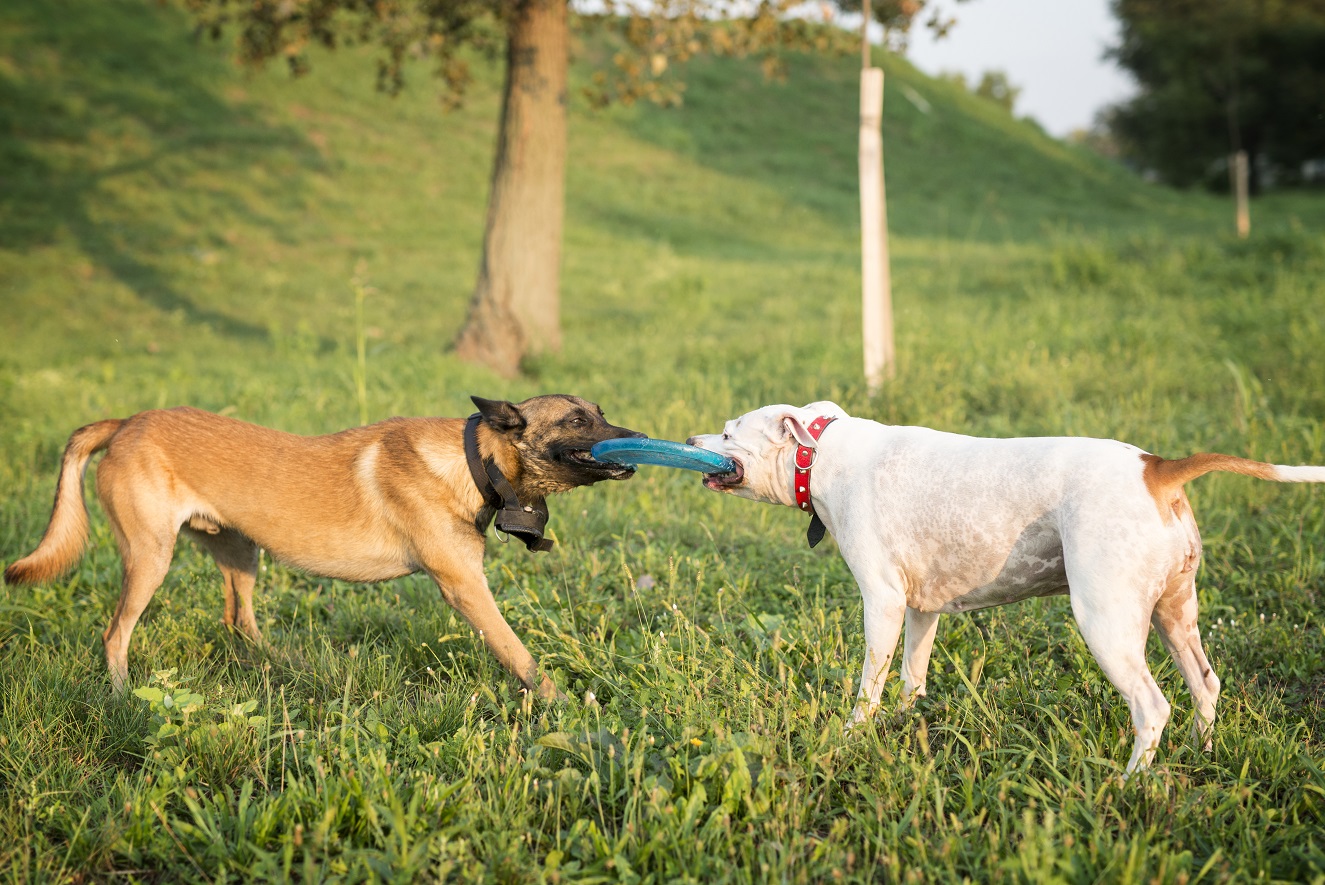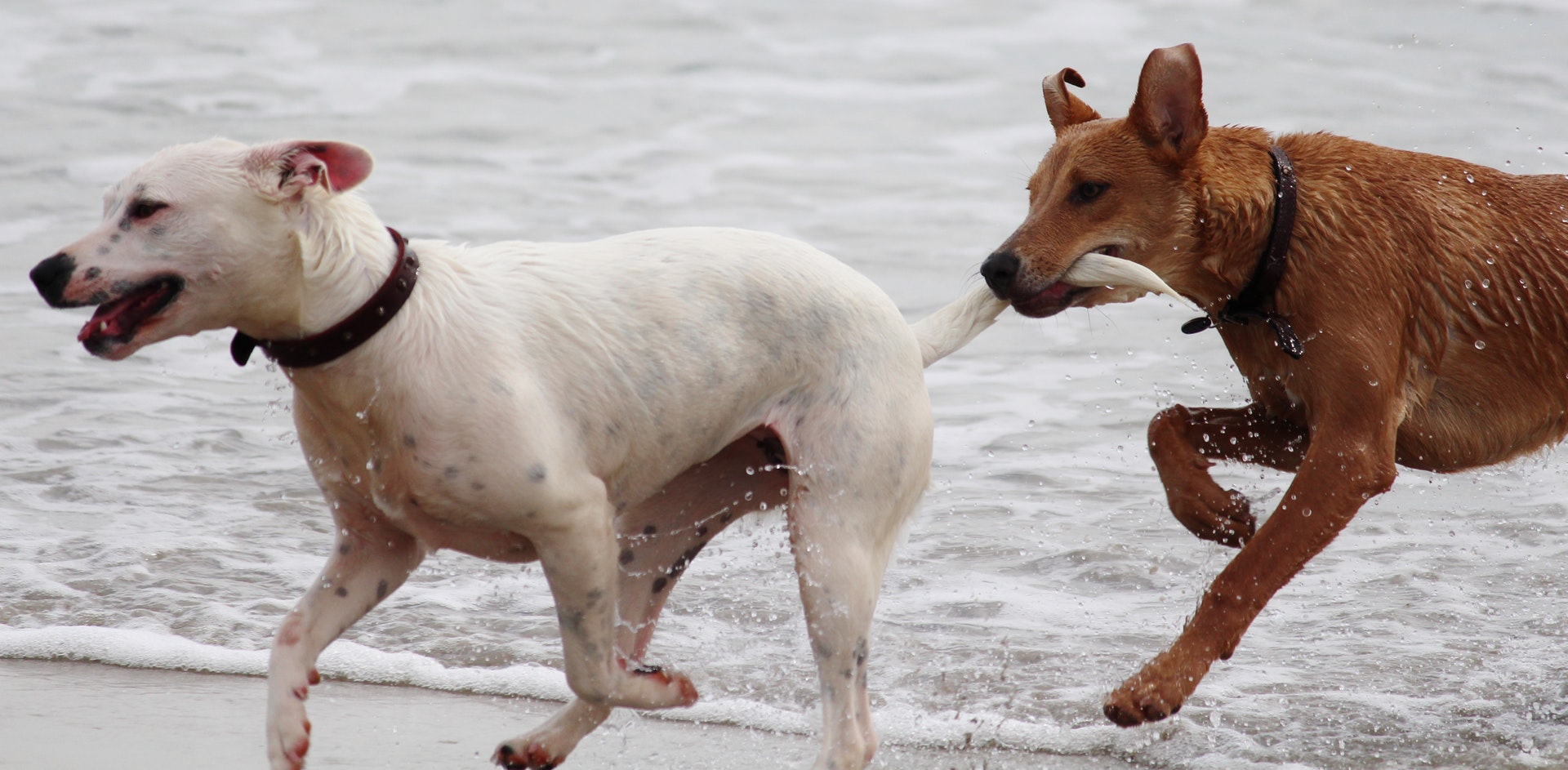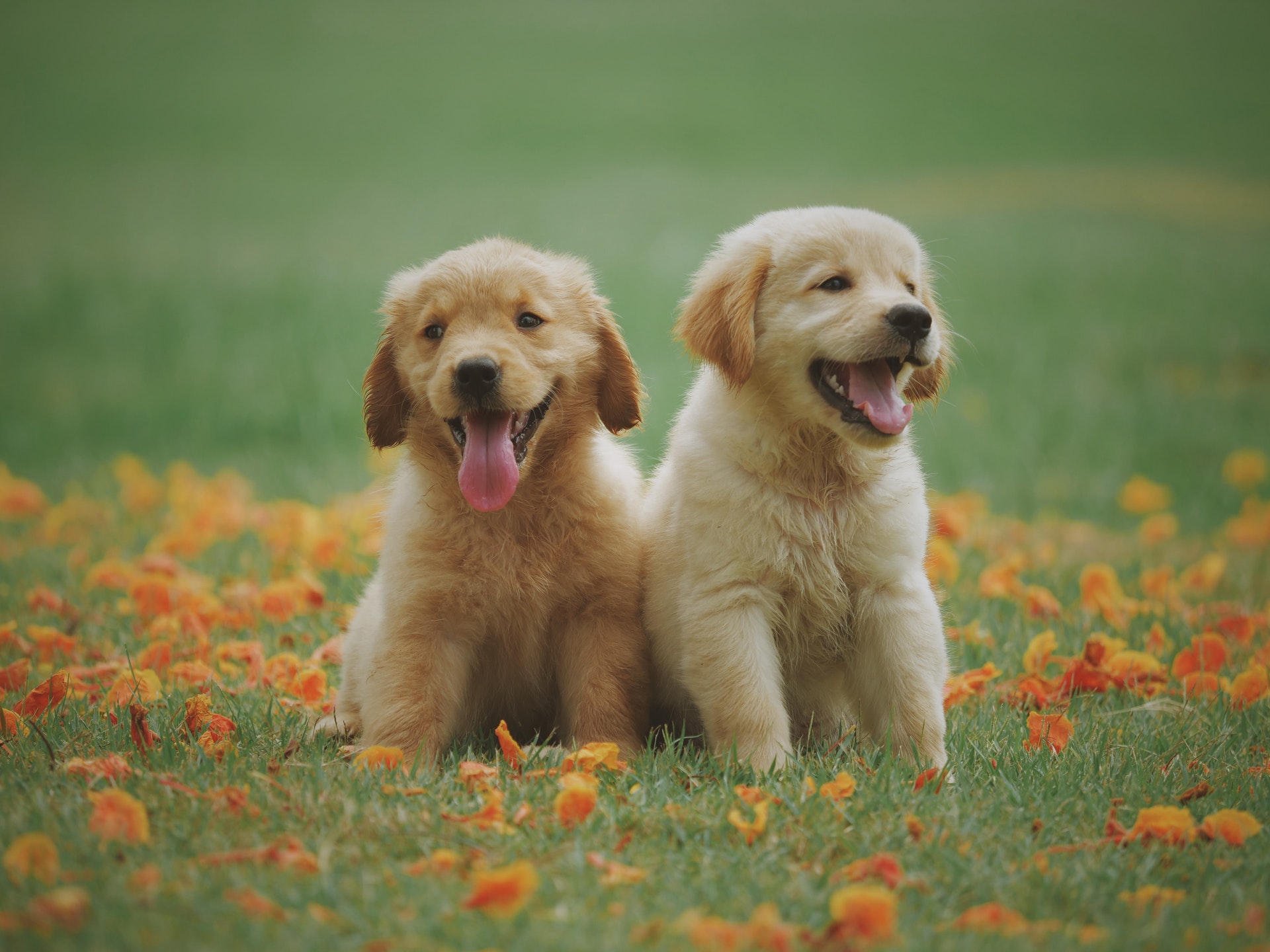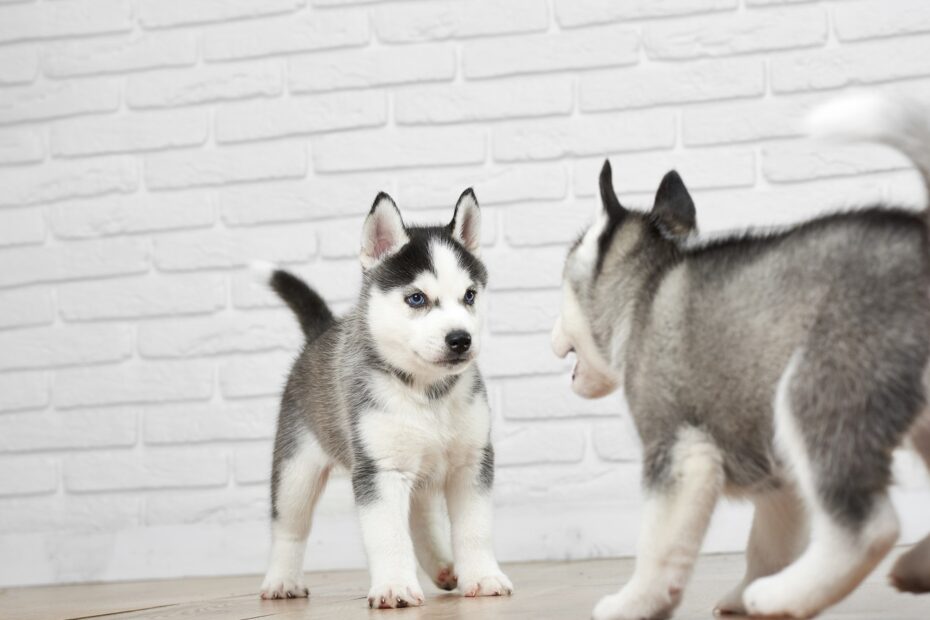If you want to learn how to stop sibling puppies from fighting, then you’re in the right place.
Siblings fight; that’s a fact. Whether it be play fighting, roughhousing, or any other type of fight. There’s always going to be a constant battle to determine who’s top dog (or puppy in this case) when it comes to establishing order in the pack.
But what happens when this seemingly harmless play goes a little too far?
…How do you know when wrestling stops being playful and turns into a real fight?
…What do you do if one of your puppies is constantly pushing the boundaries of playtime?
Anyone that has ever owned a puppy will tell you it’s all a natural part of growing up and a common way for them to learn boundaries.
But even so, it’s still something you should discourage from a young age to stop any aggressive outbursts as they mature into fully grown adult dogs.
When it comes to stopping these fights, learning to recognize the warning signs early is a must if you’re going to intervene successfully.
And while there’s no harm in leaving your puppies be if they’re just roughhousing for a minute or two. It’s still important to keep a close eye on things in case the situation escalates.
Now, the good news is that there are several things you can do to step in and stop sibling puppies from fighting.
Better still, they have nothing to do with committing to long and complicated training programs. And instead, involve just 5 simple exercises that will make your puppies highly responsive and calm.
Now, I can’t take all the credit for these exercises because I actually picked them up a few years ago from Dan Abdelnoor over at The Online Dog Trainer. (see video below)
But if there’s one thing that’s guaranteed, it’s that these exercises are a sure-fire way to calm ANY dog or puppy, regardless of age, breed, or temperament.
So before you do anything else, check them out before moving on.
Here’s the link to take a look: 5 Step-By-Step Calming Exercises To Quickly & Easily Stop Puppies Fighting…
(video will open in a new window)
What Causes Sibling Puppies To Fight?
It sounds obvious, but interaction with others teaches puppies normal social behavior. Such as what is and isn’t appropriate when it comes to interacting.
Healthy play allows a puppy to develop a strong social foundation while also learning to read body language and other nonverbal behavioral cues.
And it’s this normal dog-on-dog behavior as puppies that essentially lays the foundation for skills they use throughout their lives.
With this in mind, play fighting is an important part of a puppy’s early development, and you shouldn’t look to break it up.
However, puppies in a real fight will have very different behavioral cues and body language than puppies that are just playing.
For instance, if you’re one or both of your puppies is displaying real aggression, they’ll often assert more of a stiff posture or fixed stare rather than them being their usually bouncy self.
In addition to this, you might also notice their hackles will be raised, their teeth will be bared, and they’ll often display a low growl or snarl.
Put simply, you should instantly be able to tell if your pups are having an actual scrap instead of playing.
To figure out why, here are some of the more common reasons it happens…
They’re fighting for attention
Some puppies demand the attention of their owners and become aggressive if they don’t get it.
What’s more, if they notice one of their siblings receiving more attention, they might take it as an opportunity to show their disapproval by lashing out and attacking.
Basically, they’re jealous of the attention being given elsewhere.
If this is the case, you need to make a conscious effort to ensure you don’t show any type of favoritism towards either of your pups. This way, they won’t be fighting for your attention at every opportunity.
They’re fighting to be the pack leader
As you’ll probably already know, dogs are pack animals. And their natural instinct is to fight to lead their pack and dominate their siblings.
The urge to be the pack leader will be stronger in some puppies than others, and while you might find one or more of your pups is submissive and willing to back down, others won’t be so quick to give in.
So if you notice your pups fighting regularly, it could simply be a case of them trying to assert their dominance.
Related Post: How To Stop Dogs From Fighting – 6 Ways To Break Up Any Dog Fight

They’re fighting over food or toys
Just like children, sibling puppies can often be guilty of fighting over toys or food. This is usually down to either one of your puppies being possessive or resource guarding.
In some situations, your puppy might instinctively attack the other if they feel like they’re given a rough deal when it comes to getting their fair share of food or toys.
So keep a close eye, and if you find that one of your pups directly attacks another when it’s time for food or play. Then there’s your answer.
Again, this type of behavior might be a pre-emptive act of aggression to assert pack leadership and needs to be addressed sooner rather than later.
They’re fighting over territory
As well as being pack animals, dogs can also be very territorial.
This doesn’t mean they’re necessarily territorial over their entire home or yard, rather that they’re territorial over a specific place that they want to protect.
This is commonly a place where they might rest or sleep, such as a particular dog bed or even a particularly comfortable section of their owner’s bed.
And when they feel threatened or think their sibling is trying to enter their preferred space, they might attack to protect it.
Now, taking all of the above into account, it’s clear that your pups could be fighting for more than one reason.
Even if they begin as play fights, it’s not uncommon for them to turn nasty pretty quickly. Which, over time, can develop into more troubling behavior.
And it’s safe to say that if you don’t address these issues before they reach adolescence. You’ll have a very big problem on your hands once they’ve grown into aggressive adult dogs.
This is something that Dan over at the Online Dog Trainer addresses when taking you through the 5 step-by-step calming exercises I mentioned earlier.
Because not only will these exercises teach your puppy to remain calm. They’ll also teach your pup to be in complete control of their emotions in any situation that triggers it.
So before moving on, watch the video, impliment the exercises, and you’ll quickly see a marked improvement in your puppies behavior.
Anyway, now that we’ve looked at some of the potential reasons for your puppy’s sibling rivalry. Let’s take a look at a few ways to put an end to their scary, aggressive behavior.

How To Stop Sibling Puppies From Fighting
It’s no secret that puppies who get into fights regularly may need additional guidance.
Better still, puppies can start getting this by learning behavioral cues (also known as commands) from as early as seven to eight weeks of age.
So starting training as soon as reasonably possible and continuing into adolescence is just one of many sure-fire ways to give them the mental stimulation they need to avoid unwanted behaviors.
However, in addition to this, there are also several things you can do at home to keep your puppies from fighting.
Which I’ll introduce now…
Figure out why they’re fighting
Without understanding the reasons for their fights, it’s going to be very difficult for you to change your puppy’s behavior.
Now, as we’ve already introduced, puppies fight with their siblings for several reasons. So your first job to do a little detective work and ultimately figure out what the cause of the fight is.
So next time you notice signs of a fight about to break out, pay particular attention to the way it starts and think about the following:
- Is the same pup responsible for starting all of the fights?
- Do the fights take place at the same time each day?
- Does something happen immediately before the fight that could be a trigger?
- Do your pups fight over a particular object (food or a toy, for instance?)
It might take you a little while to work out the root cause to exactly why your puppies fight, and you may even find that some fights are different from others.
But if you’re able to identify some patterns and define the root causes of the behavior. Pretty soon, you’ll be able to put in place a plan of action to stop the fights from breaking out in the future.
Separate your pups at sensitive times
Even if you don’t think food or play is the primary cause of the fight, it’s still a good idea to separate your puppies at what we identify as ‘sensitive times’ of the day.
To prevent unnecessary fights, think about doing the following:
Step #1:
Make sure you have separate food and water bowls for each pup and put them in different places, not right next to each other.
If you notice they fight over food, don’t leave it down during the day for them to return to.
Step #2:
Give each pup their own toy/s to play with and during playtime. Also, be mindful of giving them equal attention.
If you focus your energy on one pup, you could unknowingly provoke the other.
Step #3:
Ensure each puppy knows where their sleeping area is and don’t allow them to swap under any circumstances.
If they’ve been sleeping together, consider buying separate beds and see if it has a positive impact.
Set an example
You may not be aware of it, but the fact of the matter is that puppies pay attention to your behavior and lead by the example that you set.
If your house isn’t calm or you’re constantly stressed or on edge. Your puppies will soon start to pick up on it.
Over time, this can manifest itself as aggressive behavior towards their siblings.
We all lose our temper once in a while, and that’s ok. But if you find yourself losing your cool too often, you need to make a conscious effort to be as calm and collected as possible around your puppies.
If you find yourself losing your temper and raising your voice, it’s very likely a negative impact on your pups, which could result in fights breaking out.
Teach them to be calm
Creating a calm environment at home is the first unwritten rule when it comes to puppies.
Again this stems back to the previous point about maintaining your composure when you’re around them.
Remember, a relaxed dog is a happy dog, so try not to introduce too many stimulants that could cause anxiety or upset.
And if all else fails, those 5 step-by-step calming exercises I introduced you to earlier are a great first step in teaching your puppies to be calm and in control.
So if you’re looking for more techniques and ways of getting your puppies into a calm, responsive state, it’s well worth a few minutes of your time.

Wrapping Things Up
Puppies require social interaction in order to mature into confident, well-adjusted dogs.
And knowing how to tell a healthy tussle from a true fight is crucial to ensuring your puppy’s successful development.
At the end of the day, it isn’t the best decision to tolerate fights between your puppies in the hope that they will just grow out of the habit.
Because even if it’s mild, the reality is that it’s likely to get worse over time if left unchecked.
But whichever way you decide to teach your pups right from wrong, it’s highly important that you keep calm, collected, and patient, as adding fuel to the fire won’t end well.
But if you follow the steps outlined in this above (along with the 5 step-by-step calming exercises), you’re puppies’ dangerous, aggressive fights will soon become a thing of the past.

